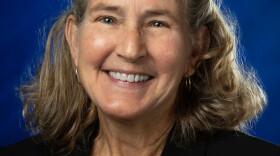Metro Council District 17 encompasses several suburban cities and neighborhoods in east Louisville, including Anchorage and Lyndon.
There are two Republicans in the May 17 primary. One Democrat, the incumbent, is running unopposed.
Kent Hall, a Republican, lives in Murray Hill. He worked for the County Clerk’s office for nearly three decades. He ran unsuccessfully for Metro Council’s District 7 seat in 2018.
Marvin Odom, a Republican, is also on the ballot. He lives near Anchorage. Further information about him was not available.
Markus Winkler, 42, is a Democrat and the incumbent candidate for District 17. Winkler sits on three Metro Council committees: Government Oversight and Audit, Budget and Equity and Inclusion. He is also in his third consecutive one-year term as chair of the body’s Democratic Caucus. Outside of Metro Council, Winkler works as a strategic project advisor and lives in Anchorage.
Winkler was the only candidate who responded to a questionnaire from WFPL News. His responses were edited for clarity and length.
What are your ideas for helping residents in your district navigate the next phases of COVID-19, which could include intermittent surges, in terms of their health, finances and social needs?
Winkler: Ensuring we have access to support services such as the Neighborhood Place are key. Even now, I receive calls from residents who are struggling with the financial impacts of the pandemic. These are people often unaccustomed to asking for help and may not know where to turn for utility or mortgage assistance, food assistance, etc. Additionally, ensuring the health department is ready should another surge occur is important. That's why I am proud of the allocations we have made through the American Rescue Plan — we will be ready should we need it but if we don't have another surge, those resources can be redeployed to other efforts. One item that the pandemic has highlighted is the shortage of mental health services access in our community. More must be done to attract professionals, help young people enter the field, or take other measures to de-stigmatize mental health services.
What investments, reforms or new initiatives would you pursue to decrease violent crime and homicides in Louisville?
Winkler: I am proud of having pursued an ‘all of the above’ approach to public safety. There are three critical areas — prevention, enforcement, and adjudication. For prevention, I have supported funding for violence interruption initiatives, youth engagement initiatives, efforts that target retaliatory violence, the Group Violence Initiative (GVI), housing, and employment. To truly tackle crime, we must engage young people, provide them access to opportunities, and ensure they have positive role models. Some of this work has begun but will require time and commitment to bear fruit.
For enforcement, we need to ensure we have enough police officers (which I am proud to have championed with both the new Fraternal Order of Police contract and recruitment incentive). We need to ensure we conduct constitutional preventative enforcement, we need to focus on efforts like GVI and we need to target the illegal narcotics trade which seems to be the root of so much senseless killing. We should also be pursuing policies that aggressively seek to expand the number of police officers we have on the street, such as a pipeline from Metro Corrections FOP, Fort Knox recruiting, etc. On adjudication, we need to implement the new Juvenile Transfer Center and work with the judiciary to ensure actions have consequences and violent offenders receive significant penalties.
In your view, what are the city's greatest needs in terms of housing, and how would you address them through legislation?
Winkler: We need significantly more housing at all levels but particularly at our lowest and middle-income levels. We should pursue zoning and other non-financial incentives that promote housing, work with developers to identify regulations that add cost to the affordability of units, shorten the approval time and make it easy for private developers to do business with the city, and focus on homeownership in our poorest areas.
What do you see as the No. 1 issue facing your district in the next five years?
Winkler: The single biggest issue I am concerned about is maintaining the quality of our area. Specifically, most of the commercial anchors in District 17 are national chains and other strip malls with little character and limited connection to our area. As national trends around retail continue, what happens to the buildings housing big box stores if the tenant leaves? What sort of downward pressure does lots of empty retail space put on a neighborhood? If large commercial areas start to fail, they bring down all of the surrounding areas. As this occurs, property values decrease, crime increases and outcomes are worse. Ensuring we are planning for this is critical.
Using neighborhood plans that build upon placemaking infrastructure — uniform and upgraded signage, landscaping, streetscapes, walkability, and neighborhood form districts — so that we build diversity of retail and housing infrastructure is critical. We have incredible assets that anchor our area, from Tom Sawyer Park to the Kentucky Truck Plant to interstate access to great small cities. We need to build upon these assets by planning and incentivizing developments like Westport Village that promote walkability and a sense of neighborhood.








